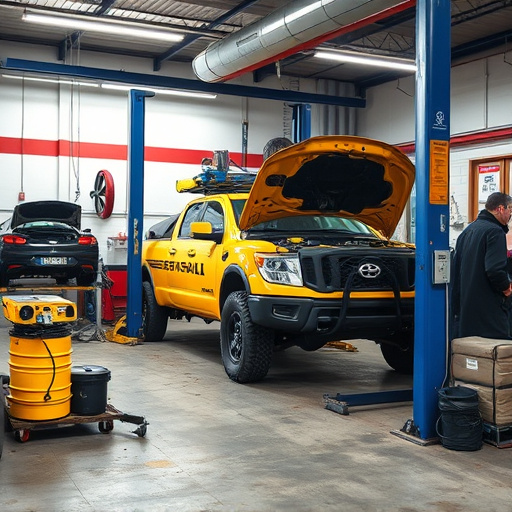A Customer Satisfaction Guarantee (CSG) is a powerful tool for auto repair businesses, ensuring top-quality service and fostering client trust. By offering warranties on parts and labor, collision repair centers can differentiate themselves, meet aesthetic and safety standards, enhance their reputation, and drive repeat business. An effective CSG program relies on clear communication, robust quality control, and efficient after-sales support to build and maintain customer loyalty in a competitive market.
In today’s competitive market, a robust Customer Satisfaction Guarantee (CSG) is no longer an optional strategy but a necessity for modern businesses. This article explores the art of marketing CSG benefits, providing a comprehensive guide for success. We’ll delve into the essence of CSG, dissecting its key components to ensure effectiveness. Next, we’ll uncover powerful marketing strategies, including messaging techniques, leveraging data and testimonials, and utilizing digital channels. Finally, we’ll discuss measuring success through KPIs, customer feedback, and fostering continuous improvement, ensuring your CSG program thrives.
- Understanding Customer Satisfaction Guarantee (CSG)
- – Definition and significance in modern business
- – Key components of an effective CSG program
Understanding Customer Satisfaction Guarantee (CSG)

A Customer Satisfaction Guarantee (CSG) is a powerful tool that ensures customers receive top-quality service and products. It serves as a safety net, providing peace of mind to clients who invest in essential services like collision repair or auto frame repair. In the event of dissatisfaction, a CSG allows for easy resolution, encouraging businesses, especially those specializing in car paint repair, to uphold their reputation and maintain customer trust.
The CSG concept is simple yet effective: guarantee the work performed will meet specific standards, ensuring customer satisfaction. For collision repair shops or auto body experts, this could mean offering a warranty on parts and labor for a set period after the initial service. By implementing such guarantees, these businesses can differentiate themselves from competitors, fostering long-term relationships with clients who appreciate the security of knowing their investment is protected.
– Definition and significance in modern business

In today’s competitive business landscape, a customer satisfaction guarantee (CSG) stands as a powerful tool for fostering trust and loyalty among consumers. It is a commitment made by a company to ensure that its products or services meet or exceed customer expectations, often backed by promises of replacement, refund, or repair. This strategy has become increasingly significant, especially in sectors like the automotive industry, where a car body shop or collision repair center faces constant scrutiny for the quality of their work and the care they take of customers’ vehicles.
A CSG acts as a differentiator, setting businesses apart from their competitors by demonstrating a deep understanding of customer needs and a willingness to stand behind their offerings. For a collision repair center, this could mean guaranteeing that repairs are done with precision and materials of high quality, ensuring the car’s original aesthetic and safety standards are met. Such guarantees not only protect customers but also build a positive reputation for the business, fostering repeat business and word-of-mouth referrals, which are invaluable in the modern market.
– Key components of an effective CSG program

An effective Customer Satisfaction Guarantee (CSG) program hinges on three primary components. Firstly, clear communication is vital. Customers must understand what’s covered under the guarantee and the terms and conditions associated with it. This transparency builds trust and ensures expectations are set from the outset. Secondly, a robust quality control process is essential. Ensuring that repairs or services meet high standards guarantees customer satisfaction. For instance, a reputable collision repair shop like Mercedes Benz would implement rigorous quality checks to maintain its reputation and honor the CSG.
Lastly, efficient after-sales support plays a crucial role in reinforcing the guarantee’s value. Promptly addressing any issues or concerns raised by customers demonstrates commitment to service excellence. Consider an auto body restoration process; if a client isn’t satisfied with the final result, quick action to rectify the issue will significantly enhance their experience and solidify the brand’s promise of a satisfying CSG.
A robust Customer Satisfaction Guarantee (CSG) strategy is a game-changer for modern businesses, fostering trust and loyalty among customers. By implementing key components such as clear communication, consistent delivery, and proactive feedback mechanisms, companies can enhance their CSG benefits. In today’s competitive market, understanding and leveraging the significance of CSG is essential to stand out, ensure customer retention, and drive business growth.













